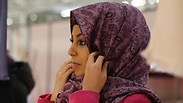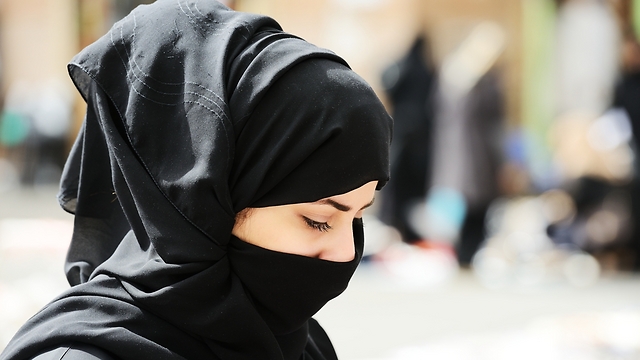
European rabbis slam EU court ruling on religious symbol bans
Court of Justice sets precedent for enabling employers to ban visible religious symbols in the workplace, in a ruling related to dismissal of 2 women for refusing to remove headscarves; move sparks harsh words from European chief rabbi: 'Europe's faith communities are no longer welcome.'
Chief Rabbi Goldschmidt, President of the Conference of European Rabbis, issued a scathing statement slamming Tuesday's first ruling by the European Union's top court on the issue of women wearing Islamic headscarves at work.
According to the precedent-setting decision, employers may bar staff from wearing visible religious symbols.
“This decision sends signals to all religious groups in Europe. With the rise of racially motivated incidents and today’s decision, Europe is sending a clear message; its faith communities are no longer welcome,” the statement read.
“Political leaders need to act to ensure that Europe does not isolate religious minorities and remains a diverse and open continent.”
On the eve of a Dutch election in which Muslim immigration has been a key issue and a bellwether for attitudes to migration and refugee policies across Europe, the Court of Justice (ECJ) gave a joined judgment in the cases of two women, in France and Belgium, who were dismissed for refusing to remove headscarves.
"An internal rule of an undertaking which prohibits the visible wearing of any political, philosophical or religious sign does not constitute direct discrimination," the Court said in a statement.
"However, in the absence of such a rule, the willingness of an employer to take account of the wishes of a customer no longer to have the employer's services provided by a worker wearing an Islamic headscarf cannot be considered an occupational requirement that could rule out discrimination."
Amnesty International issued a response condemning the decision, particularly given the sensitive political and social climate surrounding religious identification.
"Today's disappointing rulings ... give greater leeway to employers to discriminate against women—and men—on the grounds of religious belief," said the statement. "At a time when identity and appearance has become a political battleground, people need more protection against prejudice, not less."
The Open Society Justice Initiative, which submitted a brief supporting the women, also expressed disappointment.
The group's policy officer, Maryam Hmadoum, contended that the decision "weakens the guarantee of equality that is at the heart of the EU's antidiscrimination directive," which the Court of Justice cited in weighing the cases.
The European Court of Justice made separate decisions on the cases, but linked them.
In the Belgian case, Samira Achbita, a receptionist at a security firm, was fired in June 2006 for wearing an Islamic headscarf, banned in a new set of internal rules by her company that prohibited visible signs of their political, religious or philosophical beliefs. Belgium's Court of Cassation sought guidance from the Luxembourg-based European court which rules on cases involving EU law, which applies to all EU members.
While the cases were linked by the European court, the French case differs and offers Asma Bougnaoui a reason for optimism because the reasons for her dismissal as a design engineer were based, not on internal rules, but on the complaint of a customer unhappy with her Islamic headscarf.











